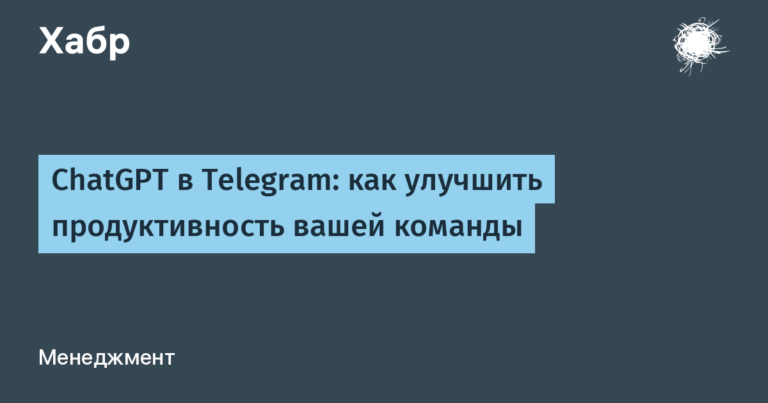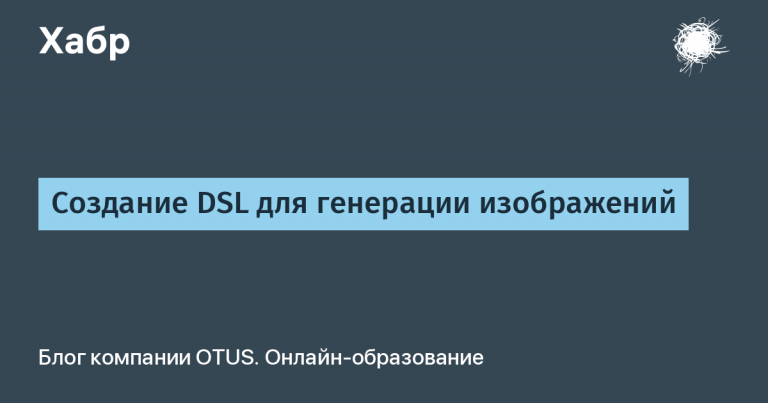How to stop worrying and start living in the age of AI
I myself “welder not real”and I don’t understand anything in artificial intelligence, but when“all around and talk about the sea and the sunset”, there is an irresistible desire to understand at least at the everyday level, “what is, comrades, the sea and what is, comrades, sunset“. If anyone is interested in (another) amateur point of view on what to do with the approaching technological singularity – welcome under cat. But I warn you right away, you will not find anything new there, just a reflection of one natural intellect.

What is intelligence?
I’ll start with wikiI always start with it:
Intelligence (from Latin intellectus “perception”; “understanding”, “understanding”; “concept”, “reason”) or mind is a quality of the psyche, consisting of the ability to recognize new situations, the ability to learn and remember based on experience, understanding and applying abstract concepts, and using their knowledge to manage the human environment. The general ability to know and solve problems, which combines cognitive abilities: sensation, perception, memory, representation, thinking, imagination.
That is, to observe intelligence in an object, the object itself must have the following:
the ability to receive information from the surrounding world – sensation and perception;
the ability to store the received information – memory;
the ability to analyze the information received – representation and thinking;
the ability to predict the desired impact on the environment – thinking and imagination;
ability to influence the environment;
In general, an object with intelligence should be able to receive information about its environment, remember this information, analyze it, synthesize its reaction in accordance with the “meaning of life” (objective function) and influence the environment in a favorable way.
If we take this definition of intelligence as a basis, then we must admit that “intelligence” is a fairly common phenomenon. Even a worm has all of the above attributes of intelligence, including memory.
The main property of intelligence
Are all properties of intelligence equally important? Is it possible to rank the properties of intelligence according to their importance?
In my opinion, it is certainly impossible to deny the intellect the need to obtain information, store it and analyze it. Without these three points, in principle, we cannot talk about any kind of thinking. But how much does the intellect need any impact on the environment? And the associated ability to synthesize?
I admit the possibility of the existence of an intellect that has the ability to create a control action, but does not have the opportunity (or purpose) to apply this influence. A sort of Buddhist monk, dispassionately contemplating what is happening around. We can even ask him for advice, but not the fact that he will give it to us – because this can destroy his impassivity. And if this monk does not say anything to anyone and does not interact with this world in any other way, then he is no different from the stone statue of the Buddha himself. Yes, perhaps his intellect has reached Enlightenment and cognized the Highest Truth, but from the point of view of an outside observer, it is difficult, even impossible, to detect intellect in him.
Thus, I personally believe that the intellect must manifest itself in some way that is meaningful to the environment. It’s not that I deny intelligence to meditating Buddhist monks or stone statues, it’s just that I don’t pay attention to such intelligence. Each meaningful intelligence must have an objective function in its control action generation block. The meaning of the existence of the intellect. In principle, the very existence, life – this is a change in the environment in accordance with this target function. It is the target function that determines the direction in which the intellect synthesizes its decisions, forms the life priorities of the intellect.
Thus, we can say that the ability to change the environment is the most important property of the intellect, and the objective function is the main characteristic of this property.
What is artificial intelligence?
Well, everything is simple here – any object created by a person, in which all 5 of the above properties are present:
sensors for reading information about the environment;
an analyzer constituting a model of the environment;
memory reflecting the impact of events on the model;
a decision block generating an environmental impact in accordance with the objective function and data from the memory and the analyzer;
means of environmental impact;
Any object with these properties is an Artificial Intelligence. Yes, at least the same autopilot in your car.
That is, AI is as common in our lives as ordinary intelligence.
Which intelligence is stronger?
At first glance, the answer is asking – one that knows more. It has more information for analysis, more rules for synthesis. Yes, the total amount of knowledge (experience) of an individual is certainly a certain indicator of the level of intelligence, but much more important is the relevance of this experience, its applicability in achieving one’s goals. I still know a lot about the MS-DOS device, but this knowledge does not help me in any way in developing web applications.
It turns out that a stronger intellect is not one that has unique or diverse knowledge, but one that more successfully applies existing ones. But how do you define success in this context? What intelligence can be considered successful, and what – not? In my opinion, that intellect is considered successful, whose actions to change the surrounding world more fully satisfy its own target function.
But how to compare the objective functions of, say, an earthworm and cruise control? What is the completeness of satisfaction – in speed, in economy or in long-term impact? It turns out that we can compare intelligences only if they have an intersection of interests (goals) and they can fight each other: directly – for example, on a chessboard, or indirectly – through tests.
Is there any interest common to all intellects? So that it can be used to compare all the intellects and identify the strongest. I’m afraid that even the instinct of self-preservation is not such – male praying mantises are an example of this.
Nevertheless, there is something inherent in all intelligences without exception – both natural and artificial. This is the ability of the intellect to change the environment. Can this ability be somehow used to assess the strength of the intellect? Who is intellectually stronger – a monkey with a grenade (or a nuclear bomb) or a man with a shovel? It is intuitively clear that intellectually a person is stronger than a monkey, although in the short term a nuclear bomb can change the landscape much more than a shovel.
In general, in order to be able to determine which intelligence is stronger, it is necessary to compare intelligences in confrontation (competition) or on a set of tests. If two intelligences do not have common goals in the objective function, then their comparison is basically impossible. How can you compare the intelligence of a worm and cruise control.
What is super intelligence?
Einstein taught that everything in the world is relative. We can’t compare the intelligence of a worm and a cruise control, but we can compare two different cruise controls or two different worms. Super intelligence is always “super“only in relation to another intellect, which itself in relation to it”uber“. In my opinion, super-intelligence solves all the same tasks as uber-intelligence, only better – faster and better. Circle of Opportunities “supera” can be wider than the range of possibilities “ubera”, and cannot be narrower. Otherwise, he goes from the category “super” into rank “just different” – competing in a number of tasks, but not superior.
We can limit the number of tasks and compare intelligences relative to each other on this limited sample. For example, in games – in chess or in go. In this case, we can rank the players by intelligence and identify those (“uber”) who never wins over others (“supers”).
But can one countsuperomSomeone who only wins 90% of the time? At 95%? At 99.9%? Should super-intelligence have a total advantage over uber-intelligence, or is it just overwhelming? In my opinion, the overwhelming is not enough for the proud title of super, but someone may have a different point of view.
Total: you can be a super only in relation to “related”intelligence – an intellect that solves similar problems, i.e., has the same goals in its objective function. For example, a car’s cruise control is super-intelligent to me (and to most people) in the matter of maintaining a set speed on the road.
When does intelligence become dangerous?
The impetus for this post was the hype with “technological singularity” the apotheosis of which was letter calling for a suspension of AI research for six months. So I’m a web developer myself, but then it’s time to figure out whether it’s worth once again learning a new fashionable framework or the upcoming Skynet will drive the remnants of humanity into the Stone Age, in which any frameworks will become irrelevant. I have already described my thoughts, and now the conclusions.
Based on the foregoing, the intellect begins to pose a danger when its means of influencing the environment are sufficient to create this very danger. Somewhat tautological, but still. A meditating monk is no more dangerous than a stone Buddha.
Any intelligence does not pose any danger if it does not have any means of influencing the environment. Any intellect does not represent the danger, the avoidance of which is explicitly included in its objective function. But if, on the contrary, the creation of some kind of danger is inherent in its objective function, then such an intellect will strive for its goal in all ways available to it.
The presence of the prefix “super” at the intellect does not add any new intrigue to the above. Even if some kind of super-intelligence appears, surpassing all of humanity put together in its capabilities, it will still pose a danger only within the framework of its capabilities. Well, even a super-intelligence will not be able to drop the moon into the Pacific Ocean. At least at the current technical level.
The beauty of the situation is that the appearance of Super-AI for me personally does not change anything in any way. I do not consider myself the smartest creature on the planet, so I am not afraid of possible competition from his side. I periodically encounter intelligences (natural and artificial) that are head and shoulders above my personal intelligence in certain matters. I fully admit that there is such an intelligence (separately human or social) in relation to which I am an uber-intelligence, but this super-intelligence is so smart that it does not give me the opportunity to realize its existence. And I am constantly in danger, which comes from other intelligences – animals, people and machines. It’s just a familiar danger that I know how to coexist with.
In other words: “What was, is what will be; and what has been done is what will be done, and there is nothing new under the sun.” (With)
PS
Well, what about “technological singularity” – in Nature there is not a single process that develops exponentially for an infinitely long time. Even the process of expansion of the Universe is not such. If we see an exhibitor somewhere, we just need to take a step back and look at it on a different scale.





